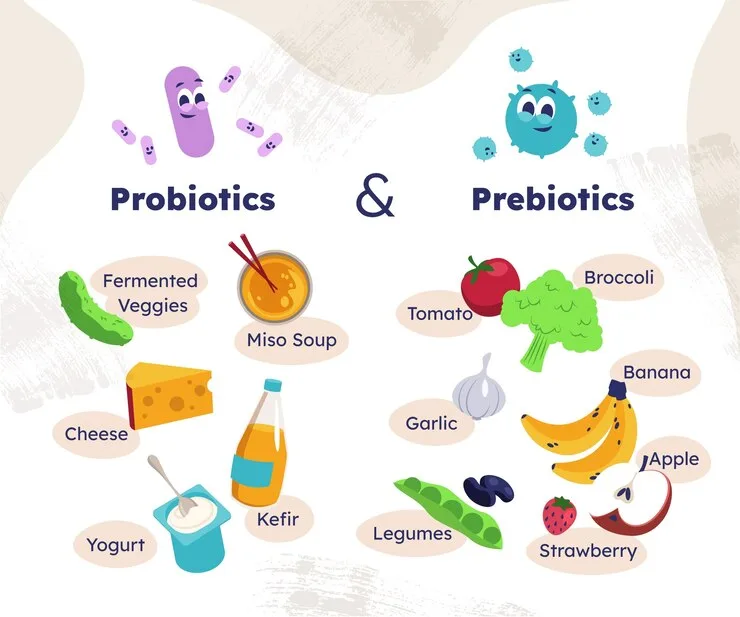From boosting digestion to enhancing immune function, probiotics have long been celebrated for their array of benefits. These beneficial bacteria are essential for maintaining a healthy gut, which in turn supports overall health and well-being. Incorporating probiotic-rich foods into your diet is a natural way to bolster your immunity. Whether you’re exploring healthy eating or looking to up your wellness game, these foods are an excellent start.
The Power of Probiotics for Immune Health
Probiotics, also known as “good bacteria,” are live microorganisms that provide health benefits when consumed. They play a crucial role in maintaining gut health by keeping harmful bacteria in check, aiding digestion, and enhancing nutrient absorption. A healthy gut is directly linked to a strong immune system. In fact, about 70% of the immune system is housed in the gut, according to Healthmedsrx , making it vital to prioritize a gut-friendly diet.
Why Probiotic-Rich Foods?
While probiotic supplements are popular, getting these beneficial microbes from food is often more effective and accessible. Whole foods provide not only probiotics but also other nutrients that support overall health. Including a variety of probiotic-rich foods in your diet can provide diverse strains of good bacteria, each beneficial in its unique way.
Top Probiotic-Rich Foods to Boost Your Immunity
1. Yogurt
Yogurt is perhaps the most well-known probiotic food. Made from fermented milk and often enriched with live cultures, yogurt is a tasty and convenient way to consume probiotics. Choose yogurts that have “live and active cultures” on the label, as these are the ones that contain probiotics. Greek yogurt, in particular, is a great choice due to its high protein content and creamy texture.
2. Kefir
Kefir is a fermented milk drink with a tangy flavor and a consistency similar to thin yogurt. It’s packed with several strains of probiotics, making it a powerhouse for gut health. Regular consumption of kefir can help enhance your immune response and improve digestion. Plus, it’s a versatile ingredient that can be used in smoothies, dressings, or enjoyed plain.
3. Sauerkraut
This fermented cabbage dish is not only delicious on sausages and sandwiches but is also rich in probiotics. Sauerkraut undergoes a natural fermentation process that promotes the growth of healthy probiotics. It’s also a great source of fiber and vitamins C and K, further supporting immune health. For maximum probiotic benefit, opt for unpasteurized sauerkraut found in the refrigerated section, as pasteurization kills the beneficial bacteria.
4. Kimchi
Hailing from Korea, kimchi is a spicy, fermented vegetable dish, commonly made with cabbage and radishes. Like sauerkraut, kimchi is teeming with beneficial probiotics. It also contains high levels of vitamins A, B, and C and is flavored with garlic and chili peppers, which have antiviral properties. Including kimchi in your diet can add a flavorful kick and a probiotic boost to your meals.
5. Miso
Miso is a traditional Japanese paste made from fermented soybeans. It contains a rich concentration of probiotics and is commonly used in miso soup, dressing, and marinades. Miso is also packed with protein, essential minerals, and vitamins, making it a nourishing addition to your diet. Just remember to add miso to your dishes at the end of cooking to preserve its probiotic content.
6. Tempeh
Tempeh is another fermented soybean product with a firm texture and nutty flavor. It’s an excellent plant-based protein source and contains probiotics that support gut health. Tempeh is versatile; it can be sautéed, baked, or used in stir-fries, salads, and sandwiches. Including tempeh in your diet is a flavorful way to get both probiotics and protein.
7. Kombucha
Kombucha is a fermented tea beverage that’s become increasingly popular for its probiotic content. This fizzy drink is made by fermenting sweetened tea with a symbiotic culture of bacteria and yeast (SCOBY). Besides being a refreshing and low-calorie alternative to soft drinks, kombucha supports gut health with its probiotic content. It’s available in a variety of flavors, so you’re bound to find one you enjoy.
8. Pickles
Fermented pickles—those made without vinegar—are a crunchy, tangy probiotic food option. They host a good amount of probiotics and can be a delightful addition to sandwiches or salads. When shopping for pickles, look for those labeled as fermented or naturally fermented to ensure they contain probiotics.
How to Incorporate Probiotic Foods into Your Diet
Including probiotic-rich foods in your daily meals doesn’t have to be a chore. Here are some ideas to effortlessly add probiotics to your diet:
– Start your day with a yogurt parfait including fruits and seeds.
– Add kefir to your smoothie for a probiotic boost with breakfast.
– Toss some kimchi into your fried rice or noodle dishes for an extra punch of flavor.
– Use miso to make a delicious soup or dressing for salads.
– Incorporate tempeh into your stir-fries or taco fillings.
– Swap your soda for kombucha as a refreshing beverage.
Listening to Your Body
While adding probiotic foods to your diet can support your immune health, it’s essential to pay attention to how your body reacts. Some people may experience mild digestive changes when they start eating more fermented foods—this is usually normal as your gut adjusts. If you have specific health concerns or conditions, it’s worth consulting with a healthcare professional or a nutritionist to ensure probiotics are a good fit for you.
An Ongoing Commitment to Health
Incorporating probiotic-rich foods into your diet is a delicious and natural way to support a healthy immune system. With the multitude of options available, there’s something for everyone to enjoy. Remember, a balanced diet is more than just probiotics—it encompasses a variety of nutrients that contribute to overall health and vitality. Stay curious, experiment with new foods, and enjoy the benefits of probiotics as part of your ongoing commitment to wellness. Your immune system will thank you!


